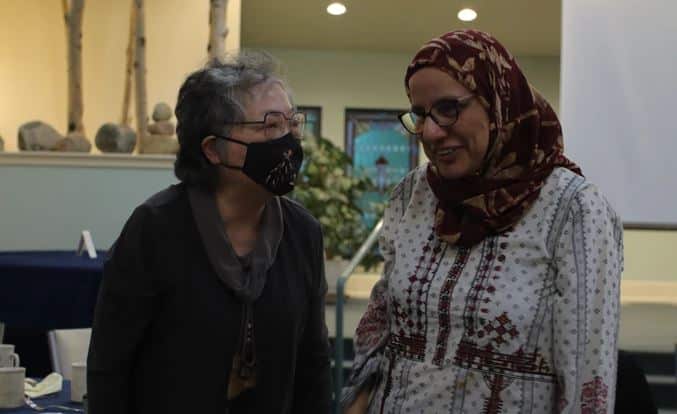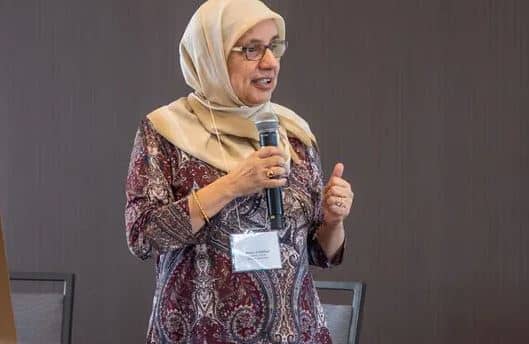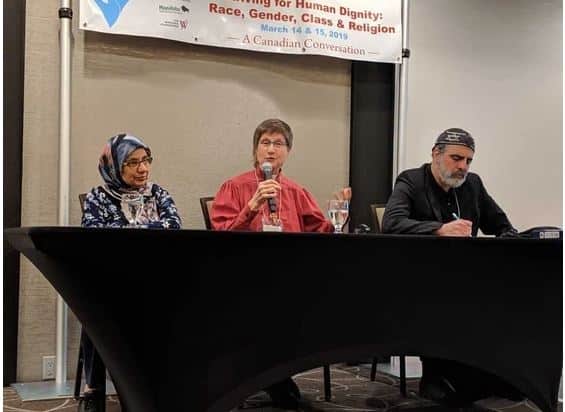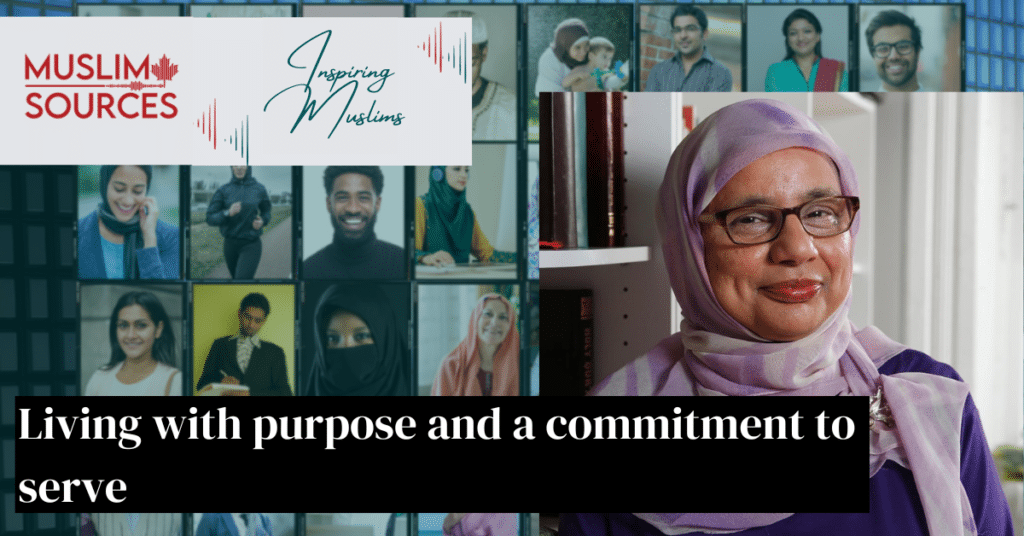Inspiring Muslims is a new series that will be run by Muslim Sources to bring out stories that will inspire and uplift our community.
Thanks to years of not seeing ourselves represented in the profiles, features and stories of successful people in the mainstream narrative, we as the Muslim community find it harder to dream big and aim high. Showcasing these success stories and inspiring journeys is pivotal to Muslim representation and to the success of our own community members.
We want to create a space to tell the stories of inspiring changemakers and trailblazers who thrive while embracing their faith and identity. These are our stories, by us and for us. Read more about the series here. If you wish to collaborate with us on this series please reach out to us at info@muslimsources.org
When she realized her local Winnipeg mosque— the Manitoba Islamic Association —did not have an outreach coordinator, then young Shahina Siddiqui stepped up to volunteer in that role and made her own business card.
“(I) introduced myself as the volunteer coordinator for community outreach for Manitoba Islamic Association.” Shahina shares with a chuckle, as she reminisces over her initial days of outreach work. It is rare to meet an individual so ready to dive head on into community service without any motivation for personal gain.
Today, Shahina Siddiqui, a resident of Winnipeg is well known throughout the Canadian and American Muslim community for her leadership and selfless service. Shahina started her journey in the 1980’s as a volunteer for ISNA (Islamic Society of North America) and her passion to help the Muslim community led her to become the voice of her people. She started writing for the media and voiced her opinions fearlessly regardless of how controversial they were.
When she became involved with the Manitoba Islamic Association in mid 1980’s Shahina realized the organization was in need of funding to print some basic marketing material. She went into a meeting with Heritage Canada provincial branch with a goal of $6000 in mind, and returned with $10,000.
“I told my husband I don’t even have a briefcase. They won’t take me seriously,” she laughs. Her husband got her a briefcase and while it was empty when she took it with her, she returned with more than she had expected. With no experience and only a vague idea of how to write proposals, she was able to secure funding and support for her organization.
In 1995, Shahina joined CAIR-Canada. The same year she organized the first month-long retreat for Muslim youth at the University of Manitoba. With over 40 kids and 13 scholars in attendance, the event was a huge success and proved to be a turning point for the attendees, as they all went on to make great contributions and took on leadership positions. But Shahina’s contribution to the Muslim community does not end there.

Shahina’s connections with the interfaith community are well known. She is often invited to sit on discussion panels to represent the Muslim perspective. She remembers a Rabbi once commenting on her outspoken personality saying “I didn’t know Muslim women could speak in public.” Shahina was not shy to voice what she thought and her eloquent way of arguing often left members of other faiths speechless.
“The same Rabbi became a good family friend later on,” she says with a wide smile.
Shahina’s desire to help her community sparked after experiencing a personal tragedy.
“This was after my son passed away,” she shares, “He had a special condition. And my husband and I —because the community was so small, there was nothing organized —so we struggled to even put the funeral together. I told my husband after that, inshaAllah if we can help it, we won’t let any family go through any difficulty alone.”
The 9/11 event was really when Shahina was flung into the role of the Muslim spokesperson. She recalls giving 72 interviews in a short span of just 48 hours. It has been 20 years since then and she still finds herself giving a few interviews a week as someone who represents the Muslim community. She mentions there was a time when it was not unusual for two op-eds to be printed in the same newspaper, both carrying her opinions. She writes well and is not scared to use her strength to dispel myths about her religion and her community.
As her presence in the media skyrocketed, so did the hate speech and death threats against her. She was accused of working with extremist groups among other things. At the same time, CAIR-USA put her name forward as one of the counsellors who could be contacted for guidance post 9/11 so she got a lot of calls, both locally and internationally. Despite some negative comments from the few local Muslims about her media presence, Shahina continued the work. She knew it was her responsibility to continue to represent her faith and community on a bigger platform.

“Being a strong woman does not help because men in leadership feel threatened,” she says smiling.
The criticism and hate speech did not stop this extraordinary woman from achieving what she had set out to do. With support and collaboration with diverse groups and like-minded activists, she continues to strive for justice and stand for essential human rights for all people.

As co-founder and volunteer executive Director of the Islamic Social Services Association (ISSA) which was established in 1999, Shahina helped publish informative specific sector booklets aimed at dispelling myths about Islam. These booklets received global recognition and the European Union has included one of them under their own informative resources.
Despite never getting any core funding for Islamic Social Services Association, Shahina and her board managed to make things happen. Her networking skills along with her charisma make it hard for people to refuse her requests. She feels strong and supported because of her diverse circle of friends who pray for her safety and good health.
When I ask her about her secret, she says that her husband’s unwavering support has been a key factor in her success. I found it endearing when she said “I told him to stop me the minute he feels I’m doing all this for any personal gain or glory.” As I hear about her life’s journey, her sincerity to her community’s well-being and to the good that she is striving for is almost tangible.
Shahina mentions her paternal grandmother as a source of inspiration for her. “She taught us Islam by living it and through modeling its core values and with her interactions with people.” And that’s where her natural counselling instincts come from, along with her amazing sense of humor.
“I’m not a counsellor, I’m not a social worker, I’m not a psychologist,” she says. “This is a disclaimer I keep telling people. That’s the funny thing, The University of Manitoba called me and mentioned they wanted to recognize me with a honorary doctorate of laws and I responded with a ‘why’. The university president laughed and said ‘Never has anybody asked me why.’” Shahina says she feels there are people who have done so much more and so much better than her and they are the ones to be recognized.
“It is funny that when people invited me to speak, either the poster would state ‘Dr. Shahina Siddiqui’ or the moderator would introduce me as such,” she laughs with a twinkle in her eye. “And I would respond with ‘I’m not a doctor.’ And they would say ‘Sister is very humble.’ I would respond ‘Sister is not humble, it’s the truth! And now I could be introduced as such.”
While talking to Shahina, I felt her easygoing nature has played a major role in her ability to handle stressful situations and not lose focus in the face of any challenges, big or small.
I ask her about the challenges she has faced and how the death threat must be the top one. She shakes her head instantly and says “Life and death is from Allah so that has never bothered me. And what better way to die than to be a martyr for truth.”
She says the challenges that were the toughest were those that came from within the community.
“The people you know have the power to hurt you more,” she says sadly.
She mentions an incident when she was wrongfully accused by some in the community who resented her public profile for taking money from someone and not returning it. Despite her husband and lawyer wanting to sue the concerned party for slander, Shahina felt uneasy about taking that step. She opened the Quran and prayed to Allah to guide her and she recalls opening the Holy Book on the verses which mention the incident of Ayesha (ra) getting slandered. She decided that she would not take any action that would put the Muslim community in a negative light especially at a time when Islamophobia was at an all time high.
“I told my husband Allah will take care of it and Allah did,”
Shahina also mentions how her mother was always her anchor, keeping her well-grounded and humble, reminding her, not so subtly, that with all the attention and media presence Shahina should remember her knowledge is limited. She is grateful her mother kept her ego in check and grounded and all the attention did not get to her head.
One thing that really stood out for me during our conversation was her unwavering trust in Allah (swt). She mentioned going unprepared to discussion panels knowing that if Allah put her in that spot, He would guide her through it. And that belief has made her unstoppable mashaAllah.
When asked about her driving force to do everything she has done, Shahina replies without a moment’s thought, “To do khayr (good work). Our life has to have a purpose. Making money has never been my objective. How else would I help but to care for people and work for justice?”
She is currently working on setting up the Institute for Muslim Mental Health Canada (the Centre of Wellness, Resiliency and Healing) where Muslims can receive culturally and spiritually compatible services and support, a much needed platform that will benefit generations to come inshaAllah.

